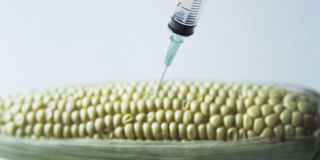To go or not to go GMO is the question

Genetically engineered maize. This is an abstract depiction of genetic engineering. The syringe represents the introduction of genes into the maize. Genetic engineering is a controversial technique whereby genes are artificially introduced into an organism to produce a desired property, such as resistance to disease or a longer shelf life. Maize was one of the first crops to have commercially viable genetically modified variants. Such crops have been grown in large quantities since 1996.
What you need to know:
- Kenyans trapped between the push and pull between pro- and anti-GMO campaigners since November 2012, when the government banned GMOs.
- Though Kenya has the capacity to develop genetically modified maize seed, biotechnology regulations have not yet been properly developed, and the ban limits scientists.
It has been promoted as a technology that will more than double agricultural production and save the world from the pangs of hunger. But it is also a technology that is still shrouded in mystery, with most Kenyans not fully understanding what it means to genetically modify an organism.
Dr Stephen Mugo, a maize breeder and principal scientist with the International Maize and Wheat Improvement Centre (CYMMIT), defines genetic modification (GM) as the process that involves taking genetic material from a different organism, to make a superior and more improved one.
“For instance, you can take genetic material from a bacteria and then add it to maize, because that bacteria has a quality that you’d like the maize to have.”
Despite the lack of understanding, Kenyans have been trapped between the push and pull between pro- and anti-GMO campaigners since November 2012, when the government banned GMOs.
BIOTECH RESEARCH
But even with the ban, the country has been able to make significant progress in biotech research on cotton and maize, in regard to disease and pest control.
The research into GM maize is now in the field trail stage, which is being conducted at the Kenya Agricultural Research Institute (Kari), Kiboko centre.
This trial is testing the MON 810 maize seed, developed specifically for the control of insect pests, more specifically stem borer.
This genetically modified seed adopted its name ‘MON’ from Monsanto, who donated the gene that makes the seed insect pest resistant.
Regina Tende, who is a senior research officer at the Kari's Katumani centre, says that although Kenya has the capacity to develop genetically modified maize seed, biotechnology regulations have not yet been properly developed, and the ban in place limits the scientists.
Still, Regina admits that it is also possible to control stem borer using a hybrid seed.
FOOD SECURITY
“We have conventionally developed seed when it comes to control of stem borer, but unfortunately it is a very slow process when it comes to developing resistant seed. It takes up to 14 years. And even then the resistance is only to an extent.”
The Kenya Organic Agriculture Network has come out as the biggest opponent of GMOs, saying that seed is much more expensive and is patented by the maker, thereby affecting the farmer’s right to save, share or re-use seed.
“Whoever owns the seed controls the food. Why do we want to put our food security in the hands of multinationals?” asks Wanjiru Kamau, KOAN’s policy manager.
“When the people get a seed that is drought tolerant and can be planted in a place like Turkana where there’s no water, I can assure you they’ll be happy with the technology,” says Betty Kiplagat, the Corporate Affairs Manager for Monsanto East Africa.
At the moment, at least 32 per cent of the world’s total land mass is under BT maize, and Kenya says it is ready to commercialise the technology.





